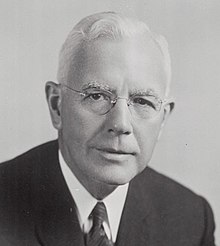John McCone
John Alex McCone (born January 4, 1902 in San Francisco , California , † February 14, 1991 in Pebble Beach , California) was an American government official and director of the Central Intelligence Agency .
biography
McCone was appointed a member of the Air Policy Commission by US President Harry S. Truman in 1947 , before becoming a special assistant to Secretary of Defense James V. Forrestal in 1948 . Then he was from 1950 to 1951, succeeding Arthur S. Barrows Undersecretary of State in the Department of the Air Force and representatives of the Air Force Secretary K. Thomas Finletter .
1958 took place by US President Dwight D. Eisenhower his appointment as chairman of the Atomic Energy Commission (US Atomic Energy Commission) . During his tenure, which lasted until 1961, he was the initiator of the Atoms for Peace program and tried to reach an agreement with the Soviet Union on a treaty banning nuclear weapons tests.
Although he himself was a member of the Republican Party , he was subsequently appointed Director of the Central Intelligence Agency (CIA) and Director of Central Intelligence by the newly elected Democratic President John F. Kennedy as successor to Allen Welsh Dulles in 1961 . As such, he was after the failed invasion of the Bay of Pigs in Cuba initiated by his predecessor in April 1961, later as a member of the Executive Committee (EXCOMM) during the Cuban Missile Crisis in October 1962, one of the most important advisers to President Kennedy. He was the first to provide essential information that the Soviet Union was planning to station nuclear weapons in Cuba. Shortly after its forecast was aerial photographs of Lockheed U-2 - reconnaissance aircraft confirmed. This led to the height of the confrontation between the USSR and the US during the Cuban Missile Crisis. During his tenure in 1963, the National Intelligence Programs Evaluation Staff was founded , the predecessor of the National Intelligence Resources Board (NIRB).
He held the post of CIA director after the assassination attempt on John F. Kennedy in November 1963, also under his successor Lyndon B. Johnson . After he was replaced by William Raborn in April 1965 , he went into the private sector . He later became a staunch opponent of the Vietnam War and early on referred to it as unusable for the USA.
In 1987 he was awarded the Presidential Medal of Freedom , one of the two highest civilian awards in the United States , along with the Congressional Gold Medal of Honor .
Web links
- John McCone in nndb (English)
- rulers.org
| personal data | |
|---|---|
| SURNAME | McCone, John |
| ALTERNATIVE NAMES | McCone, John Alex (full name) |
| BRIEF DESCRIPTION | American government official, CIA director (1961-1965) |
| DATE OF BIRTH | January 4, 1902 |
| PLACE OF BIRTH | San Francisco , California |
| DATE OF DEATH | February 14, 1991 |
| Place of death | Pebble Beach , California |

